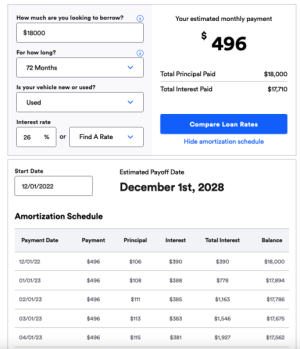I'm thinking about refinancing or even getting rid of the car. I've already been offered $10,500 by 3-4 different dealers on KBB.
You can't sell a car that you do not own in its entirety. You owe $19K on it. That doesn't change just because it's worth $10.5K. You have to pay it off first by refinancing with a personal loan in order to pay off the vehicle loan entirely. You could then sell the car for whatever you can get for it and apply the proceeds to the personal loan.
Dave would be 100% against this. Some would compare it to rearranging the deck chairs on the Titanic, although I don't think that your ship is sinking. However, part of Dave's philosophy is that taking out a loan in order to pay down a debt only makes you feel as if you have accomplished something when all you have done is move debt around.
One reason this is not a good idea is that people rarely take fees and taxes into consideration when they sell a vehicle. Depending on where you live, there can be sales tax and title transfer fees that eat away at that $10.5K. In addition, that $10.5K offer may ending up at quite a bit less based on the condition of the vehicle when the buyer inspects it.
For another thing, people rarely take that huge check and go right to the bank to apply it to their personal loan. They often use it to pay off other expenses or take vacations, etc. And suddenly that $10.5K becomes $7K. And you still owe the bank $12K after applying it to the loan. It's human nature, especially when you're struggling to make ends meet you you suddenly have this huge chunk of money.
Finally, how will you get to work if you only have one car amd your wife is using hers to get to work? Are you going to drive her to work in the opposite direction from where you work and then do the reverse thing when you're finished? I know that it's been suggested in the past but you didn't seem to be open to becoming a one car family.
I hope your post was just a knee jerk reaction to recent setbacks that you posted on the Debt Dumpers thread. Yes, I started reading that thread once it was pointed out on this thread that you were active there and had made tremendous strides in becoming debt free. You need to evaluate the total impact this kind of move would have on your financial journey. I believe that things can get better as you pay down your debts. It won't happen overnight and there will always be setbacks because that's life.
Dave's advice might not work for you. It isn't for everyone. His advice requires a lot of personal sacrifice. Every dollar has a name. Eating rice and beans, beans and rice. Selling everything until the kids think they're next. Living like no one else so that later you can live like no one else. The first 3 steps are the hardest but once you're past them, you are conditioned for success in the next 4. It's okay if his method doesn't work for you. The best method is the one you can live with AND gets you to where you want to be.




